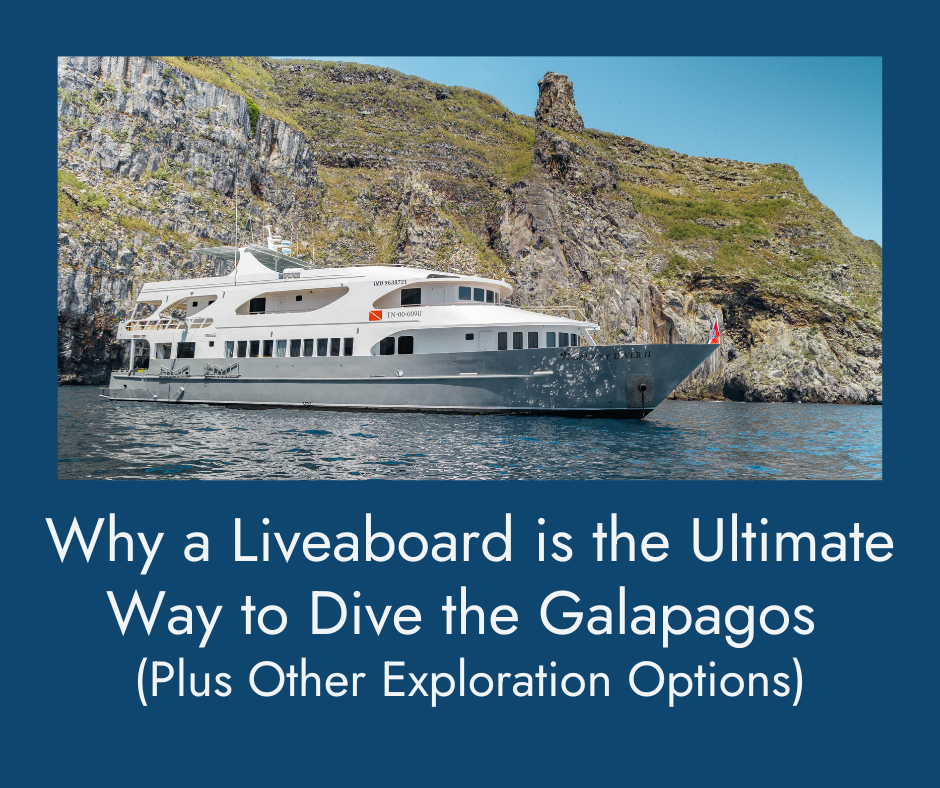Galapagos Travel Info & Guides · 05. March 2025
Liveaboard diving in the Galapagos offers a superior experience over day diving due to its access to remote, pristine dive sites like Darwin and Wolf Islands, increased dive times, and expert guidance. It allows divers to enjoy multiple dives a day at optimal times, comfort between dives, and the chance to dive with like-minded enthusiasts. This immersive experience is unmatched in exploring the Galapagos' unique underwater world, making it the ultimate adventure for diving aficionados.
Galapagos Travel Info & Guides · 03. March 2025
Discover essential travel advice for the Galapagos in our post, covering frequently asked questions, booking tips, and planning information for flights and hotels.
Galapagos Travel Info & Guides · 08. January 2025
This article explores why liveaboards are the ultimate way to experience scuba diving in the Galapagos Islands. It explains the benefits of liveaboards, such as access to remote dive sites like Darwin and Wolf Islands, multiple daily dives, and an all-inclusive adventure.
Marine Conservation & Whale Shark Research · 14. October 2024
Join Galapagos Shark Diving and make a difference in shark conservation through our Citizen Science Expeditions. In 2024, we tagged five newly named whale sharks—Elise, Luna, Makeba, Olivia, and Star—each contributing vital data to protect these gentle giants. With every dive, participants help gather critical research data, supporting efforts to safeguard one of the world’s most important marine ecosystems. Learn more about our whale shark conservation work and how to get involved.
Galapagos Travel Info & Guides · 01. October 2024
Dive responsibly with these eco-friendly tips to protect marine ecosystems on your next adventure. Choose sustainable dive operators, use eco-friendly gear, avoid single-use plastics, maintain buoyancy control, and never touch marine life. Participate in clean-up dives and citizen science projects, support local conservation efforts, and use reef-safe sunscreen. By adopting these practices, you can help preserve the ocean’s beauty for future generations. Let’s be true stewards of the sea!
Galapagos Travel Info & Guides · 01. October 2024
Prepare for an unforgettable dive adventure in the Galapagos with these pro tips. Learn about the unique dive conditions, prioritize physical fitness, and ensure safety by attending dive briefings and maintaining communication. Practice eco-conscious diving, contribute to citizen science, and stay prepared with gear checks. Follow these tips to enhance your experience while protecting this pristine marine environment. Dive in and explore the wonders of the Galapagos!
Galapagos Travel Info & Guides · 30. September 2024
Embarking on a dive trip to the Galapagos as a citizen scientist means contributing to marine conservation. Prepare by selecting the right gear, such as wetsuits and dive computers, and practicing eco-conscious diving to protect the ecosystem. Physical fitness, mental readiness, and regular equipment checks are essential pre-dive steps. Post-dive, log data, maintain gear, and engage with the community. Proper preparation ensures an impactful, rewarding experience while protecting the Galapagos
Galapagos Travel Info & Guides · 15. July 2024
The Galapagos Islands are experiencing exceptional diving conditions in 2024 with unprecedented hammerhead shark sightings due to the El Niño to La Niña transition. This shift creates optimal marine life conditions, attracting divers to large hammerhead schools. El Niño brings warm waters and less marine productivity, while La Niña boosts nutrient-rich waters, enhancing biodiversity. 2024 offers unique diving opportunities, emphasizing responsible travel to protect the Galapagos ecosystem.
Galapagos Travel Info & Guides · 15. March 2024
This guide offers essential travel tips for flying to the Galapagos Islands, detailing airline options from the US, Europe, Australia, and domestic flights within Ecuador. It emphasizes the importance of planning, entry requirements, and environmental responsibility to ensure a memorable journey to this unique UNESCO World Heritage site.
15. March 2024
Discover the unparalleled dive sites of the Galapagos Islands, from the shark-filled waters of Wolf Island to the serene beauty of Pinzon, each offering a unique underwater experience.


















